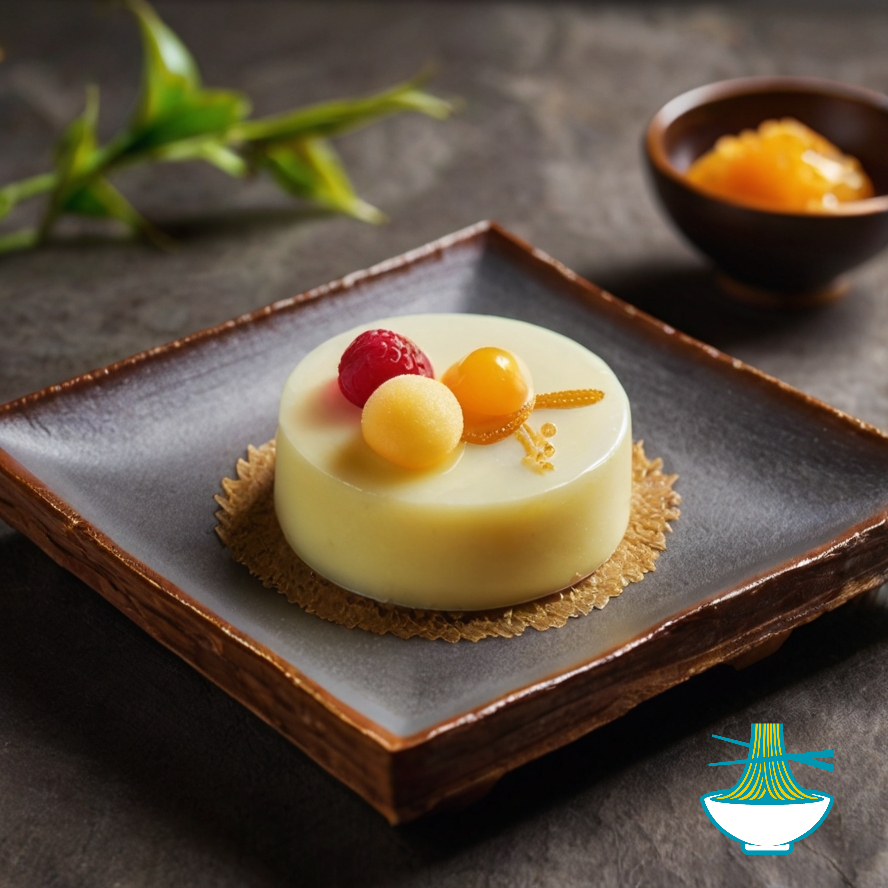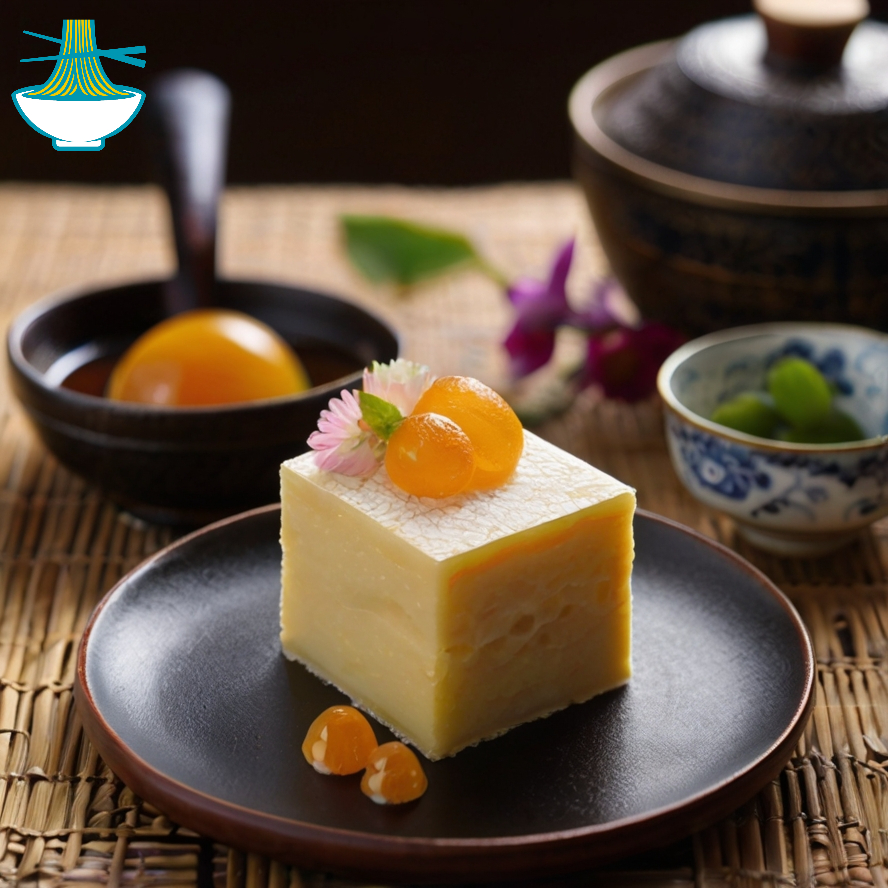Indulge in the exquisite flavors of Japan with Anmitsu, a beloved sweet jelly dessert that tantalizes the taste buds and captivates the senses. Our journey takes us through the rich history and cultural significance of this delightful treat, tracing its roots back to the Edo period. Delicate layers of colorful agar jelly, sweet azuki red beans, vibrant fruits such as peaches, strawberries, and melon, all adorned with a drizzle of sweet syrup, create a harmonious blend of textures and flavors. Anmitsu is not just a dessert; it's a culinary experience that celebrates the artistry of Japanese cuisine. Join us as we delve into the intricacies of Anmitsu, discovering the perfect balance of sweetness and simplicity that has made it a timeless classic in Japanese gastronomy.
Ingredients:
For the agar jelly:
- 10g (about 2 teaspoons) agar agar powder or agar agar flakes
- 800ml water
- 100g sugar
For serving:
- Canned or cooked sweet azuki red beans (anko)
- Assorted fruits such as strawberries, peaches, mandarin oranges, and kiwi, cut into bite-sized pieces
- Canned fruit cocktail (optional)
- Mochi (glutinous rice cakes), cut into small cubes
- Sweet syrup (kuromitsu or brown sugar syrup)
- Shiratama dango (optional; small rice flour dumplings)
Instructions:
1- Prepare the agar jelly:
- In a saucepan, combine the agar agar powder or flakes with water and bring to a boil, stirring constantly.
- Once boiling, reduce the heat to low and simmer for about 5 minutes, or until the agar agar is completely dissolved.
- Add sugar to the mixture and stir until dissolved.
- Remove the saucepan from heat and let the mixture cool slightly.
2- Pour the jelly:
- Prepare a shallow dish or mold.
- Pour the agar jelly mixture into the dish or mold and let it cool to room temperature.
- Once cooled, refrigerate the jelly until it sets completely, usually for about 2 hours or until firm.
3- Prepare the toppings:
- Drain canned fruit cocktail, if using.
- Prepare other fruits by washing, peeling (if necessary), and cutting them into bite-sized pieces.
- If using shiratama dango, boil them in water until they float, then transfer them to cold water.
4- Assemble the Anmitsu:
- Once the agar jelly has set, cut it into cubes or desired shapes.
- In serving bowls, place a few cubes of agar jelly.
- Add a spoonful of sweet azuki red beans (anko) on top of the jelly.
- Arrange assorted fruits, canned fruit cocktail, and mochi around the jelly.
- If using shiratama dango, add them to the bowl.
- Drizzle sweet syrup (kuromitsu) generously over the Anmitsu.
5- Serve:
- Serve the Anmitsu chilled and enjoy its delightful combination of textures and flavors.
Feel free to adjust the ingredients and toppings according to your preference. Anmitsu is a versatile dessert, so you can get creative with the fruits and other toppings you use. Enjoy!
Nutritional Values ;
Here's the nutritional breakdown and benefits for each ingredient in your agar jelly recipe
Agar Agar Powder (10g):
- Calories: 10
- Fat: 0 g
- Carbohydrates: ~2 g
- Protein: 0 g
Benefits: Agar agar is a vegan substitute for gelatin and is high in fiber, which can aid digestion.
Water (800ml):
- Calories: 0
- Fat: 0 g
- Carbohydrates: 0 g
- Protein: 0 g
Benefits: Hydrates and acts as the base for the jelly.
Sugar (100g):
- Calories: 400
- Fat: 0 g
- Carbohydrates: 100 g
- Protein: 0 g
Benefits: Adds sweetness and energy. Excessive consumption can contribute to weight gain and other health issues, so use in moderation.
For serving:
Canned or Cooked Sweet Azuki Red Beans (anko) (1/2 cup):
- Calories: 100
- Fat: 0 g
- Carbohydrates: 25 g
- Protein: 4 g
Benefits: Provides protein, fiber, and a slightly sweet flavor.
Assorted Fresh Fruits (e.g., strawberries, peaches, mandarin oranges, kiwi) (1 cuptotal):
- Strawberries (1/2 cup):
- Calories: 25
- Fat: 0 g
- Carbohydrates: 6 g
- Protein: 0 g
Benefits: Rich in vitamin C and antioxidants.
Peaches (1/2 cup):
- Calories: ~30
- Fat: 0 g
- Carbohydrates: ~8 g
- Protein: 0 g
Benefits: Provides vitamins A and C and dietary fiber.
Mandarin Oranges (1/2 cup):
- Calories: 30
- Fat: 0 g
- Carbohydrates: 8 g
- Protein: 0 g
Benefits: High in vitamin C and antioxidants.
Kiwi (1/2 cup):
- Calories: 30
- Fat: 0 g
- Carbohydrates: 7 g
- Protein: 0 g
Benefits: High in vitamin C, vitamin K, and fiber.
Canned Fruit Cocktail (optional, 1/2 cup):
- Calories: 60
- Fat: 0 g
- Carbohydrates: 15 g
- Protein: 0 g
Benefits: Adds sweetness and a variety of fruit flavors. Be mindful of added sugars in canned versions.
Mochi (Glutinous Rice Cakes) (1/4 cup):
- Calories: 100
- Fat: 1 g
- Carbohydrates: 25 g
- Protein: 2 g
Benefits: Adds chewy texture and sweetness.
Sweet Syrup (e.g., Kuromitsu or Brown Sugar Syrup) (2 tablespoons):
- Calories: 60
- Fat: 0 g
- Carbohydrates: 16 g
- Protein: 0 g
Benefits: Adds additional sweetness and depth of flavor. Use in moderation due to high sugar content.
Shiratama Dango (optional, 1/4 cup):
- Calories: 100
- Fat: 0 g
- Carbohydrates: 25 g
- Protein: 2 g
Benefits: Adds a chewy texture and sweetness.
Please note that these values are approximate and may vary slightly based on specific brands, preparation methods, and serving sizes. Additionally, the nutritional values for fruits can vary widely depending on the type and ripeness of the fruit used


Comments